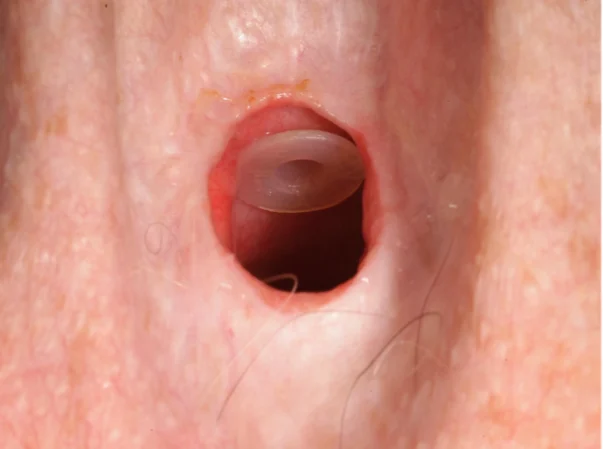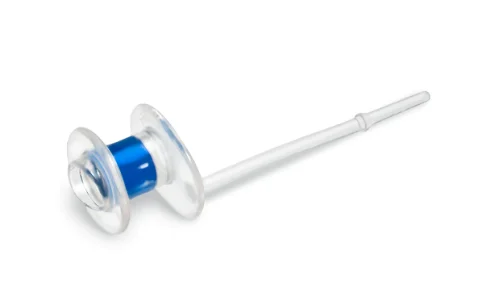In the Lary’s Speakeasy Facebook group, many laryngectomees—often referred to as “Larys”—express confusion or concern about Tracheoesophageal puncture (or prosthesis) “TEP”. In this article, I aim to clarify what a TEP is and discuss the potential benefits and drawbacks of opting for this procedure.
What Is a TEP?
TEP stands for Tracheoesophageal puncture or prosthesis. It involves a surgical procedure in which a small opening is created between the stoma/trachea and the esophagus. A one-way valve is then inserted into this opening. When activated by pressing a button on the Heat and Moisture Exchanger (HME), air flows from the trachea into the esophagus, causing tissue in the throat to vibrate and allowing the laryngectomee to produce speech.

This valve,also commonly referred to as a TEP, only permits air to pass into the esophagus, preventing liquids from flowing back into the trachea.
For a visual explanation, you can refer to this brief video.

When Should You Consider a TEP?
The timing of TEP surgery varies. Some surgeons perform the procedure during the initial laryngectomy, while others prefer to wait about a year. The reasoning behind this delay is to allow sufficient healing before introducing another factor into the recovery process. Additionally, not all patients are suitable candidates for a TEP, as some may lack the necessary tissue quality to produce a voice.
Whether the TEP is inserted during or after the laryngectomy, it’s essential to understand the pros and cons associated with it. I’ll begin by discussing the potential drawbacks.
Cons of a TEP
Leakage: Although the valve is designed to be one-way, it may occasionally leak, allowing saliva or liquids to enter the trachea. This can cause discomfort, leading to persistent coughing as the windpipe and lungs react to the presence of liquids.
Often, leakage occurs when small pieces of food become lodged in the valve, holding it open. This issue can typically be resolved by cleaning the valve with a brush. However, persistent leaks may indicate valve failure, sometimes due to a candida (yeast) buildup that prevents proper closure. This issue can be treated; for example, my own experience involved using Nystatin liquid, which extended the lifespan of my TEP from four weeks to six months.
If the leakage cannot be resolved through cleaning, a visit to your Speech-Language Pathologist (SLP) to replace the valve may be necessary. Here’s a video demonstrating this procedure.
Leaking Around the Valve: This type of leakage usually results from the valve being the incorrect size. It is common during the initial period after surgery when swelling is still present, requiring the surgeon to estimate the appropriate valve size. As swelling subsides, a shorter valve may be needed. In some cases, as happened to me, the puncture may enlarge over time, necessitating a larger valve.
Dislodging: The most concerning issue is the dislodgment of the TEP, where the valve falls out of the puncture. If it dislodges into the esophagus, it will likely pass through the digestive system without issue. However, if it falls forward into the trachea, it poses a significant risk and requires immediate medical attention to retrieve it, often involving a trip to the emergency room. While this situation is rare, it’s essential to be aware of the possibility.

Maintenance: Maintaining a TEP involves regular cleaning, typically daily or more frequently, to remove food particles and mucus. This process requires using a brush to clean the valve and may occasionally involve using a flush bulb to clear any buildup. Though maintenance is low on the list of concerns, it is still a necessary aspect of TEP care.
Pros of a TEP
Restoring Speech: The primary reason for obtaining a TEP is to regain the ability to speak. The loss of voice can be deeply distressing for many Larys, as it is a crucial part of one’s identity and personality. A TEP can significantly improve quality of life by restoring speech.
Natural-Sounding Voice: Compared to an electrolarynx (EL), which produces a robotic and monotone voice, a TEP allows for a more natural-sounding voice with inflection and a closer resemblance to pre-laryngectomy speech. While it does not exactly replicate one’s original voice in terms of tone and pitch, it enables more natural communication.
Now some people have mastered the EL, being able to even sing with it. This takes years and years of practice. Tony Talmach demonstrates here.
Convenience: Unlike an EL, which must be carried and is often misplaced, a TEP is always with you. There’s no need to worry about forgetting or losing it.
Ability to Blow Your Nose: Before your laryngectomy you couldn’t have imagined that you would miss being able to blow your nose. With a TEP you may not be able to blow your nose as forcefully as before, but it allows you to do so to some extent by holding in the HME and blowing with your mouth closed.
Smell: Though I haven’t personally tried it, some Larys have reported an ability to regain some sense of smell using a specific technique. Here’s a video explaining how it works.
In Conclusion
Deciding whether to get a TEP is a significant choice that each laryngectomee must make based on their unique circumstances and medical advice. While the TEP offers the invaluable benefit of restoring speech and enabling a more natural voice, it also comes with certain risks and maintenance responsibilities. Understanding both the advantages and potential challenges of a TEP is crucial in making an informed decision. With the right care and attention, many Larys find that the benefits of a TEP greatly enhance their quality of life, allowing them to regain a vital part of their identity and communicate more naturally with those around them.

Tony is using an EL not TEP.
I corrected that
That sounds great, I’m considering going with that,
This is a wonderful article and hits at the main points we each consider as we navigate options following our TL surgery.
After reading so many posts and articles over the last 3 1/2 years as a lary with a TEP, I feel so fortunate to have the medical care I received and continue to enjoy at the University of Chicago Medicine. I’ve read far to many horror stories of poor communication, unavailable SLP’s and/or doctors who do not educate the lary and continue proper follow ups.
My surgeon was so caring as to explain he wanted my healing to take place and to “then determine “ if I was a good candidate for a TEP! I waited 4 months and then when puncture and placement complete was instructed to wait for healing(about a week) and was also continually guided through care if TEP and practice procedures for developing my speaking skills.
Today many of my friends and family comment that though my voice is a quieter softer voice, that I sound much the same as before the surgery.
I have had almost no issues in my 3 years with the TEP. Some leakage from time to time but understand…..this is not a tight seal! It is a valve that must move with the muscles of the esophagus and trachea! I did have one dislodge into my esophagus when trying a new double flange-but-again-U of C got me in to my SLP within 48 hours, X-rays showed it NOT in lungs, puncture had not closed, we dilated puncture back to proper opening, put new one in and walla I was done in about 45 minutes.
I love my TEP. I still practice voicing. I still practice with my EL, and I may try to learn esophageal speech and also taking a class in sign language. Why not? We have no limits! At 72 I still love learning and still love teaching nurses, doctors, and EMT’s about us lary’s!
We are really a fascinating group. And as many friends and family have told me…a walking medical miracle!
The choice is ours – yours – and none are right or wrong. But…..I pray your surgeon and SLP are strong enough to give you the proper guidance as to success in whatever you choose!
May God be with you in this journey through life!
I received my TEP about 6 months after my surgery. I promise you, I don’t regret it. I can talk to family and even talk to our customers on the phone. I can’t imagine life without it now. I received my surgery and speech care at MD Anderson in Houston, TX.
1.5 yrs out my Tep has been charged many times due to leakage. Only taks a few minutes to do.And yes not very fun. But I still have a hard time talking. But you know, I like that I can talk some. I hated not being able to talk for 4 months. THANK GOD.